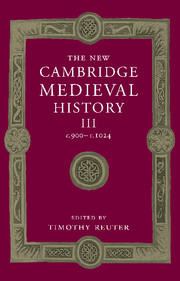Book contents
- Frontmatter
- 1 Introduction: reading the tenth century
- PART I GENERAL THEMES
- PART II POST-CAROLINGIAN EUROPE
- PART III NON-CAROLINGIAN EUROPE
- 19 European Russia, c. 500–c. 1050
- 20 Bohemia and Poland: two examples of successful western Slavonic state-formation
- 21 Hungary
- 22 Byzantium in equilibrium, 886–944
- 23 Bulgaria: the other Balkan ‘empire’
- 24 Byzantium expanding, 944–1025
- 25 Byzantium and the West
- 26 Southern Italy in the tenth century
- 27 Sicily and al-Andalus under Muslim rule
- 28 The Spanish kingdoms
- Appendix genealogical tables
- List of primary sources
- Bibliography of secondary works arranged by chapter
- Index
- Frontispiece
- Plate section
- Map 2: Archbishoprics and bishoprics in the early eleventh century
- Map 4: Germany
- Map 13: Byzantium in 1025
- References
20 - Bohemia and Poland: two examples of successful western Slavonic state-formation
from PART III - NON-CAROLINGIAN EUROPE
Published online by Cambridge University Press: 28 March 2008
- Frontmatter
- 1 Introduction: reading the tenth century
- PART I GENERAL THEMES
- PART II POST-CAROLINGIAN EUROPE
- PART III NON-CAROLINGIAN EUROPE
- 19 European Russia, c. 500–c. 1050
- 20 Bohemia and Poland: two examples of successful western Slavonic state-formation
- 21 Hungary
- 22 Byzantium in equilibrium, 886–944
- 23 Bulgaria: the other Balkan ‘empire’
- 24 Byzantium expanding, 944–1025
- 25 Byzantium and the West
- 26 Southern Italy in the tenth century
- 27 Sicily and al-Andalus under Muslim rule
- 28 The Spanish kingdoms
- Appendix genealogical tables
- List of primary sources
- Bibliography of secondary works arranged by chapter
- Index
- Frontispiece
- Plate section
- Map 2: Archbishoprics and bishoprics in the early eleventh century
- Map 4: Germany
- Map 13: Byzantium in 1025
- References
Summary
the western slavs
From the end of the fifth century or the early sixth century the presence of Slavs in the central European area is indisputable. They settled in the eastern parts of central Europe first and spread westward, that is, to the eastern parts of modern Germany, in the second half of the sixth century. The south Slavs in the Balkans soon lost contact with the remaining Slav groups, but the mutual contacts between the two constituent parts of ‘northern Slavdom’ (the western and eastern Slavs, of whom the latter were incorporated into the Rus′ state in the ninth and tenth centuries) were lively and intensive in the early middle ages and remained so as late as the first half of the thirteenth century.
The western Slavs included the ancestors of the peoples known later as Poles, Pomerani, Czechs, Slovaks and Polabi. From the linguistic point of view they were and still are divided into two fundamental groups. The northern, so-called Lechitic group includes, along with Polish, the dead Polabian and Pomeranian languages; the southern language group embraces Czech and Slovak. The languages of the southern part of the Polabian area, preserved as relics today in Upper and Lower Lusatia, occupy a place between the Lechitic and Czecho-Slovak groups. The western extremities of the region settled by the western Slavs embraced the tribes of Polabia: the Sorbo-Lusatic and Polabian-Baltic peoples called Elb- and Ostseeslawen in German. We know a good deal about the social and political formation of this area and about what in the last analysis was the lack of success of the tribes there in establishing a native socio-political organisation. By contrast with the Polabian Slavs, the Polish and Czech tribes succeeded in creating their own polities, which became important and lasting political agents in this part of Europe almost as soon as they emerged.
Keywords
- Type
- Chapter
- Information
- The New Cambridge Medieval History , pp. 514 - 535Publisher: Cambridge University PressPrint publication year: 2000
References
- 1
- Cited by

